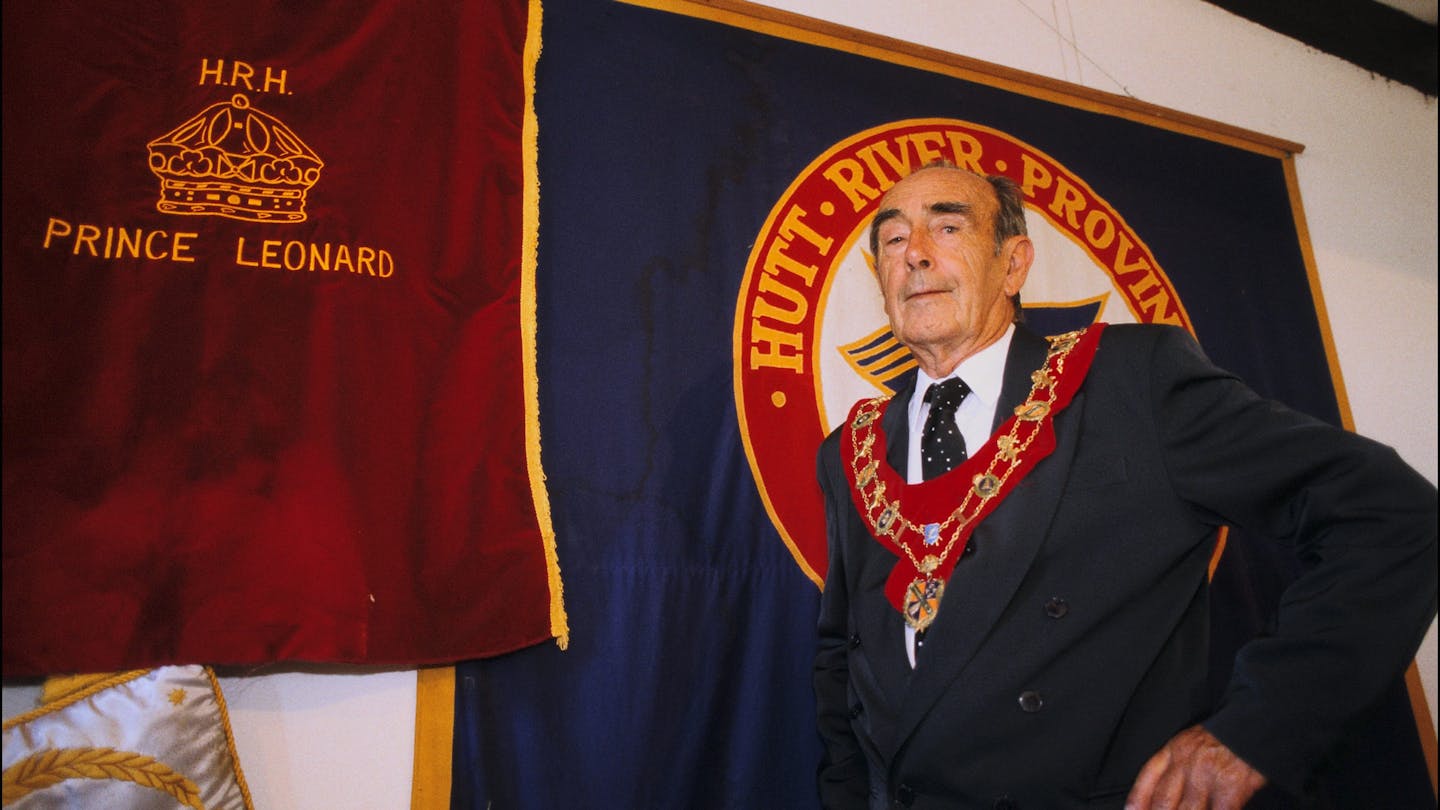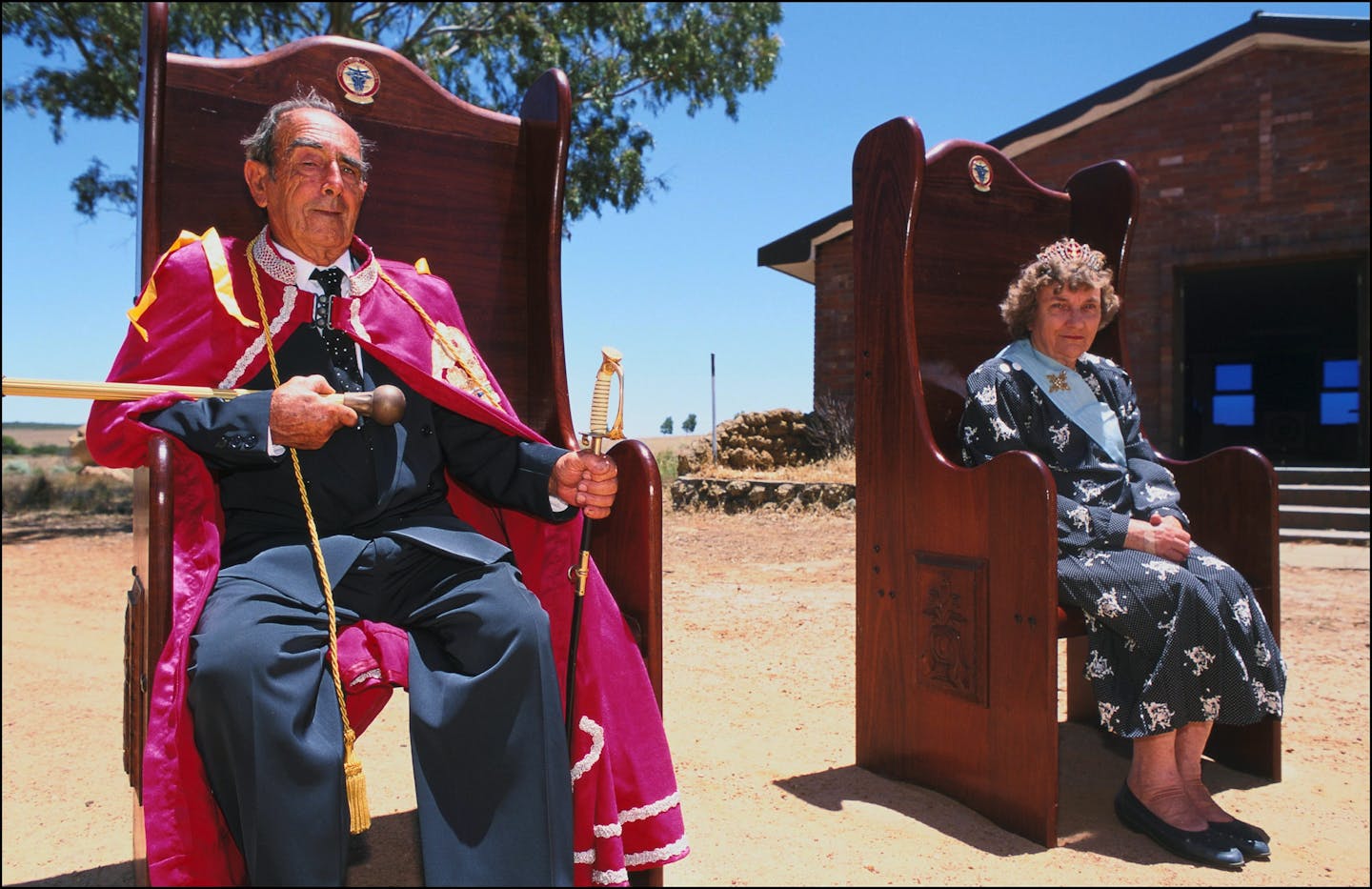
Outback Western Australia, some time in the 1970s. Picture a huge farm about 500 kilometres north of Perth, with a seemingly endless dirt road to get there.
It’s about as middle-of-nowhere as you can get.
Leonard Casley is a wheat farmer and the Western Australian government has just introduced strict quotas to avoid oversupply of wheat.
Casley has already grown the wheat. He’s not happy.
His solution is to declare his own micronation, and name himself Prince Leonard.
This peaceful protest is the first trace of Australia’s so-called “sovereign citizen” movement, which has found itself in the spotlight after proponent Dezi Freeman allegedly murdered two police officers and injured a third.
Q: Tell us about Prince Leonard
Keiran Hardy: Prince Leonard of Hutt River Province was a bit of a character. We’ve seen evidence of the more serious side of sovereign citizen threats recently, but this is a story which is a little bit friendlier, a little bit more eccentric.
He was generally a well-meaning guy who just stuck it to the government and I think people in Australia like that type of a story.
There was also a romantic story with his wife, calling her Princess Shirley, and they would sit on their thrones together.

Eventually, the courts cracked down and said “we actually need to chase this guy because he hasn’t been paying tax for so long”.
Leonard Casley eventually died around the start of COVID, and his tax debt of about A$3 million passed on to his son.
During the pandemic, there were no tourists able to get to Hutt River Province, which was the main source of revenue. The family eventually decided to declare the province to be back within Australian governance.
Q: When were the first signs of violence in the movement?
The United States is the most obvious place where you’ve seen undertones of violence.
It starts as anti-tax protest, with some far-right beliefs, and then you start getting more division and more violence in the early 90s with the growth of the militia movement, the Waco Siege, and then eventually the Oklahoma City bombing as well.
In Waco, more than 80 people were killed, including about 20 children. There was an inquiry, which said that the Branch Davidians started the fire themselves and shot two of their members in order to fulfil some of their apocalyptic views.
That was the official inquiry’s finding, but the conspiracy theory would say that this was a cover-up and that the government went in and started the fire.
The Oklahoma City bombing was two years to the day on the anniversary of Waco. Timothy McVeigh was the main offender.
Terry Nichols was the other who was prosecuted – he was a known “sovereign citizen” and he had engaged in what people call paper terrorism. It’s not the best term, but paper terrorism refers to the act of “sovereign citizens” really harassing people, government agencies and businesses with repeated legal claims that have no basis.
Read more: Treacherous terrain: the search for alleged police killer Dezi Freeman
Q: How did COVID lockdowns turbo-charge the movement?
COVID lockdowns provided a massive spark for “sovereign citizen” beliefs. It’s probably the first time that a lot of people were subject to the law in a direct way.
Everything we do is subject to the law, but for most people going about their daily lives, you’re not told by police officers what to do.
With lockdowns, vaccine requirements and mask mandates, people were being told very directly what to do by the government in a way that directly impacted their lives and people got very angry.
It was a perfect storm for “sovereign citizen” beliefs to come to the fore.
Whenever people are under financial pressure, when their livelihood is being threatened in some way – like having a wheat farm taken away, or being told to say at home during COVID – people look to explanations for what is happening, and conspiracy theories provide simple explanations that feed into your existing hatred or emotional state.
You feel uncertain. You feel like you hate the government for what they’re doing to you. You can find information online that will help you. And I think that’s why we saw the rise of a lot of conspiracy theories in that time as a way to understand what was happening.
Q: What do we know about the profile of ‘sovereign citizens’ today?
There are only a small number of empirical studies and data that tell us who “sovereign citizens” are in terms of profile or demographics. But the data suggest we do tend to be dealing with an older population, 30-50 years old. They tend to be male and tend to have existing strong grievances against government, which often result from some initial dispute or grievance.
If someone has those underlying beliefs over a long period of time, combined with a trigger event in their life or some other kind of dispute with the government, they can then search out this information online, find it very readily and then start being influenced by it to a higher degree.
Read more: The 'sovereign citizen' movement is growing. So is the risk of more violence
Q: What should police and governments do?
It comes down to some core concepts like neutrality, treating people without bias, treating people with respect.
Once we start getting into the problem of larger scale discontent like protests with an element of violence, that’s really tricky.
People are allowed to believe whatever they want, but they’re not allowed to engage in harmful activities against other people in society, to commit assaults or acts of terrorism.
How to deal with sovereign citizen beliefs is a tricky question for democracies around the world.
This article is republished from The Conversation, a nonprofit, independent news organization bringing you facts and trustworthy analysis to help you make sense of our complex world. It was written by: Keiran Hardy, Griffith University
Read more:
- How ‘sovereign citizens’ around the world draw on similar pseudo-law arguments – podcast
- Tom Phillips shooting in NZ shows what police face with skilled and desperate fugitives
- How China uses second world war history in its bid to reshape the global order – podcast
Keiran Hardy receives funding from the Australian Research Council for a Discovery Project on conspiracy extremism.


 The Conversation
The Conversation
 America News
America News Associated Press US News
Associated Press US News Raw Story
Raw Story ABC11 WTVD
ABC11 WTVD AlterNet
AlterNet Associated Press US and World News Video
Associated Press US and World News Video New York Post
New York Post